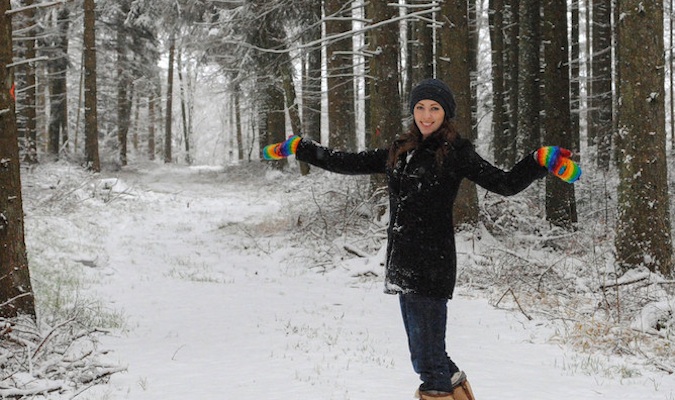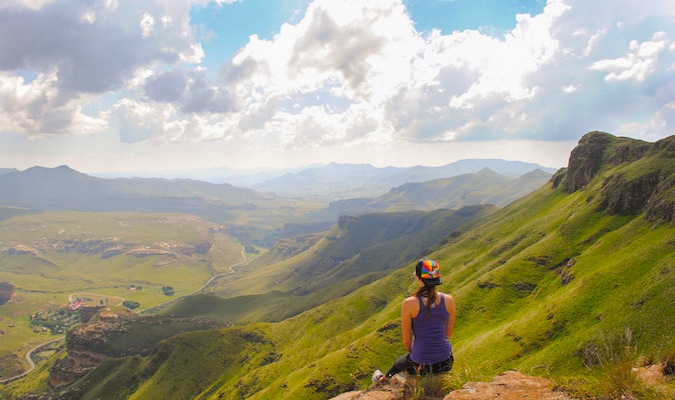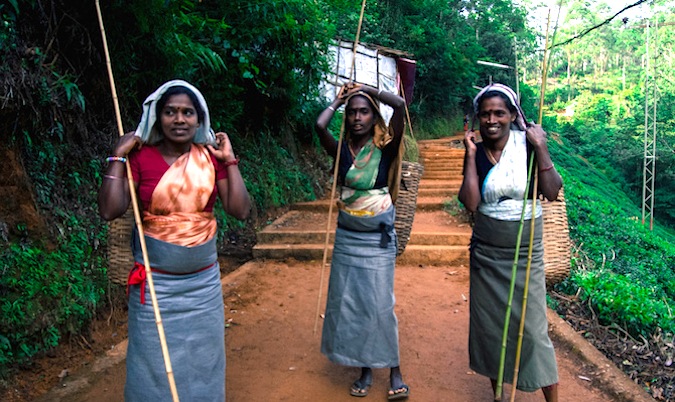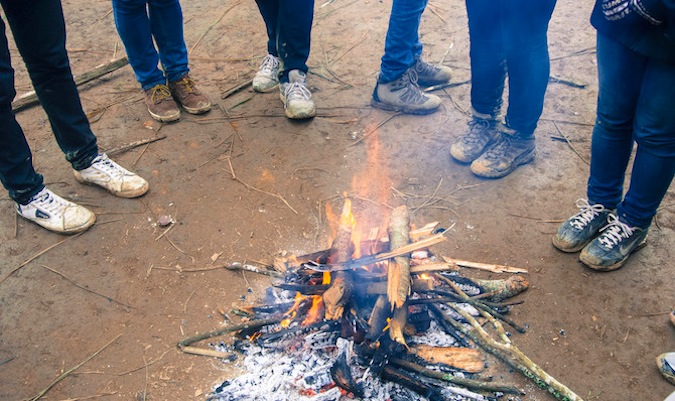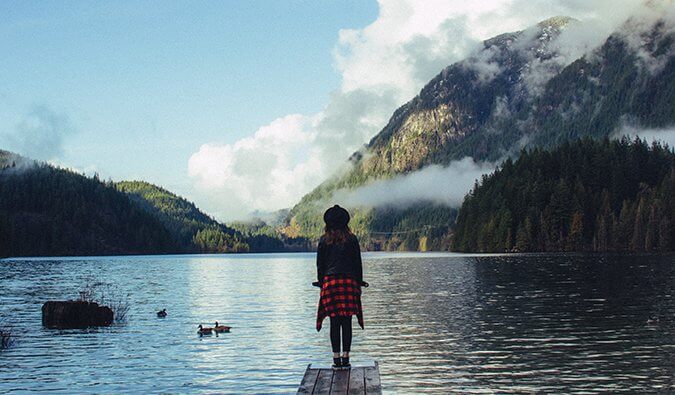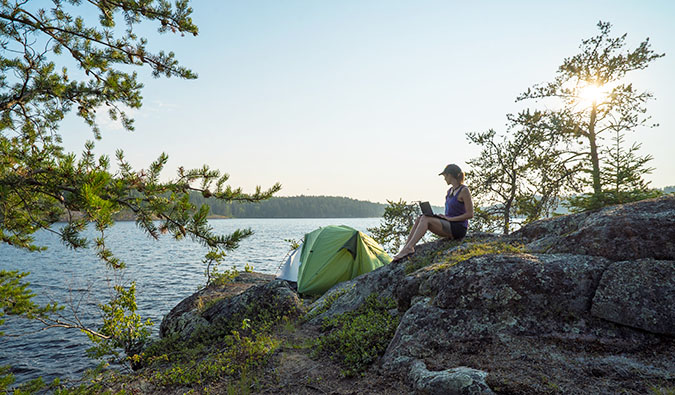
Last Updated: 3/20/23 | March 20th, 2023
Kristin Addis from Be My Travel Muse is our go-to solo female travel expert. It’s an important topic I can’t adequately cover, so I brought in an expert to share her advice. In this post, she shares her best solo female travel safety tips and advice.
One of the chief concerns for most would-be solo travelers is safety.
Can I stay safe on my own? How can I convince my friends and family that I’ll be okay?
The good news is this: you will be safe on the road.
It’s easier than you think because you already have the skills you need: the same methods you use to stay safe at home are relevant abroad as well.
Most people are scared before taking off on their first solo adventure. It’s easy to be nervous before heading somewhere new — and totally normal. Even women who have been traveling alone for years still get nervous before heading to a destination that’s completely different. There are a lot of unknown factors (will you make friends? will you be safe?) that you’ll turn over and over in your brain.
On top of that, way too many people will try to scare you and tell you not to travel alone because it’s not safe — even though they have never traveled alone themselves and have no idea.
Yet other people will tell you that some places are absolutely not dangerous at all — even though the statistics say otherwise.
So, what’s a traveler to do?
The good news is that much of travel safety comes down to just being careful. Solo travel as a woman is incredible, but like anything, it’s important to take standard precautions, such as researching beforehand, following your intuition, and using common sense.
Traveling alone as a woman can be one of the most freeing, empowering, and eye-opening experiences you can ever have. Here are some tips I’ve learned that have helped me feel comfortable (and stay safe) while on the road:
Safety Tip #1: Trust your gut instincts
There’s much to be said about the power of intuition. If something or someone gives you an uneasy vibe, there’s no shame in walking away or saying no. If your gut is telling you that something doesn’t feel right, listen to it. This sense naturally becomes more heightened over time as a solo traveler.
Some people thought I was crazy and even stupid to hitchhike through China with a friend, but after years on the road, I trusted my intuition enough to sound the alarm bells if something didn’t feel right.
There were times, such as late at night in Rome when I’ve been offered a ride and immediately said no because I knew something was off. It’s surprising how much listening to that little voice in the back of your mind can steer you in the right direction.
Safety Tip #2: Don’t be afraid to say no
Don’t be afraid that you will disappoint people by only saying yes when it feels right. Your solo journey is about you and nobody else.
Sometimes in bars and hostels, the group mentality to keep drinking and the pressure to partake in yet another round of shots is present on a daily basis.
Getting too intoxicated can lead to serious problems. Keep it to a few drinks at most if you’re alone without anyone to look out for you. I can’t tell you how long my list is of friends who have been robbed in alleyways in Spain or mugged in an otherwise safe Berlin because they became too intoxicated.
If you do go out to a bar, always watch your drink and don’t leave it unattended or accept drinks from people you don’t know. Also, if you go out with the people from the hostel it’s always a good idea to make sure you stay with them and leave with them if you’re in a new city. If they want to go to another bar and you’re tired, take a taxi back.
For this and other personal reasons, I have quit drinking alcohol completely, at home and on the road, and that not only has kept me safer but also led me to meeting people on my travels who are interested in things other than partying, and that’s led to more enriching experiences overall.
Safety Tip #3: Keep a dummy wallet and whistle
In order to keep your most important valuables safe, some travelers suggest using a dummy wallet, which is a fake wallet that contains some canceled credit cards and a little bit of cash. It’s enough to make a would-be thief think he’s getting something worthwhile while keeping your real valuables well hidden (like under the insole of your shoe).
Another important tool is something that makes noise. A whistle has come in handy more than once for me, especially when I remembered the tale of another solo female traveler who once used it to ward off rabid monkeys in Indonesia.
I did the very same several months later when, in a split second, I remembered to use my whistle as an angry monkey was lunging toward me. It goes to show that you never know how useful something so small can be.
Safety Tip #4: Get advice from locals
Make full use of the platforms available online to understand what to look out for in the area you are traveling to, especially if it’s your very first time traveling solo in the area. Facebook, Couchsurfing, Meetup.com, The Nomadic Network — there are tons of online communities you can join to get insider info.
I find asking safety questions on these platforms is sometimes more reliable than some travel information websites as they are much more current, though it wouldn’t hurt to research common scams and dangers in your destination on them.
For Americans, that would be the Bureau of Consular Affairs.
Ask employees at your hostel, hotel or guesthouse which scams to look out for. Find out not only what you should see during your visit but also which areas to avoid. Nobody knows this better than the people who live there year-round.
Finally, a reputable walking tour at the beginning of your trip in a new city is not only a great way to have a proper introduction to the area, but also an opportunity to ask questions and get more safety tips from your local guide.
Safety Tip #5: Dress appropriately
Dress like a local in order to blend in. By standing out, you risk more than just annoying catcalls. In some countries, the culture is simply more conservative, or people dress up a bit more and certain things just aren’t appropriate. For example, in a lot of places in Europe, unless you’re at the beach, wearing flip-flops is frowned upon in some places, as is wearing hats indoors. And yes, in certain countries, women can’t dress as they please and need to cover up.
In traditionally Muslim countries, for example, wearing shorts and tank tops is not advisable and can be perceived as offensive. It’s best to at least cover the shoulders and the knees. This also applies to many houses of worship around the world such as the Vatican, Greek monasteries, synagogues, temples, and mosques. It’s handy to keep a long scarf with you to cover your shoulders so you don’t have to buy or rent one there as they usually like to charge a lot!
Do some research on what’s appropriate to wear before packing.
That seems obvious, but it’s still all too common to see topless girls on the beaches in Thailand, or super short shorts and crop tops in Malaysia and Indonesia.
In order to be respected, it’s important to respect the locals’ customs and modesty levels.
Safety Tip #6: Don’t walk alone at night
In some countries, it’s perfectly safe to walk alone at night. In others, it could be dangerous. Going out at night in groups or asking to be accompanied by someone else at your guesthouse or hotel is always smart.
Unfortunately, I learned this the hard way after someone grabbed me in the dark as I walked along a dirt path in Nepal. The local police and my guesthouse owner were both bewildered, saying that kind of thing never happens there.
Well, it turns out that it does, and I made sure never to be alone at night thereafter in Nepal, and now I make sure to not walk alone late at night.
Safety Tip #7: Make copies of your important documents
Although we always hope nothing will happen, it’s important to be prepared for a worst case scenario. Make copies of your important documents, including your passport, identity card, and insurance cards, and keep them in all of the bags you carry.
Keep electronic copies as well, should the worst occur and you lose the paper copy along with the physical document. Take photos of all of your important documents and store them on your phone and laptop, in addition to uploading them to a secure cloud server.
I also recommend taking photos of the electronics you are traveling with and uploading them to a cloud server. This will help prove you owned the item in case you need to make a travel insurance claim.
Safety Tip #8: Know the local emergency numbers
Look up the local emergency number online before you depart or ask the staff at the front desk wherever you’re staying. There are also apps, like TripWhistle, that provide emergency numbers from all over the world.
Of course, the best-case scenario is that you never have to use it, but it’s always smart to be prepared in case you do need it.
Safety Tip #9: Let friends know where you are
Make sure someone (a friend, family member, or fellow traveler) knows your itinerary and where you should be at any given time. Try not to go off the grid completely or for long periods of time, especially if you have worried parents back home. If you do change your plans — because it’s bound to happen sometime — don’t forget to let someone know.
Many countries have inexpensive SIM cards ($20 USD or less) that will help you keep in touch if you have an unlocked phone. Besides, if you’re on the move, having Internet access for booking travel arrangements and finding directions is often a godsend.
Safety Tip #10 : Leave your passport locked up
Don’t take your passport out with you unless you have to. It’s better to lock it up in the hostel locker or safe at a reputable hostel. You can always check with the hostel beforehand to make sure they have them (most do). There are a lot of people who lose their passports or get their bags stolen and it’s a lot more complicated to have to go sort it out at the consulate and waste days or weeks waiting for a new one.
Instead, bring a photocopy of it or keep a picture of it on your phone just in case.
Safety Tip #11: Use caution when using dating apps
I’m not saying don’t do it as it’s super common for people to use dating apps for getting dinner or drinks (or, let’s be honest, hookups). Just remember to keep it to public places and use common sense. Dating norms and expectations can vary wildly from country to country, so plan ahead and keep everything public just to be safe.
In closing, traveling solo is marvelous. It allows you to make all of your own travel decisions, promotes personal growth and independence, and can even be a bit safer since you can take in more of your surroundings than if a friend were around distracting you.
Solo traveling helps to sharpen intuition and, despite typical worries, is often no more dangerous than your hometown.
The same common sense you use at home is relevant abroad. It’s not rocket science, and as long as you’re smart about it and follow these simple tips, you’re in for a positive adventure.
Kristin Addis is a solo female travel expert who inspires women to travel the world in an authentic and adventurous way. A former investment banker who sold all of her belongings and left California in 2012, Kristin has solo traveled the world ever since. You can find more of her musings at Be My Travel Muse or on Instagram and Facebook.
Book Your Trip: Logistical Tips and Tricks
Book Your Flight
Find a cheap flight by using Skyscanner. It’s my favorite search engine because it searches websites and airlines around the globe so you always know no stone is being left unturned.
Book Your Accommodation
You can book your hostel with Hostelworld. If you want to stay somewhere other than a hostel, use Booking.com as it consistently returns the cheapest rates for guesthouses and hotels.
Don’t Forget Travel Insurance
Travel insurance will protect you against illness, injury, theft, and cancellations. It’s comprehensive protection in case anything goes wrong. I never go on a trip without it as I’ve had to use it many times in the past. My favorite companies that offer the best service and value are:
- SafetyWing (best for everyone)
- Insure My Trip (for those 70 and over)
- Medjet (for additional evacuation coverage)
Want to Travel for Free?
Travel credit cards allow you to earn points that can be redeemed for free flights and accommodation — all without any extra spending. Check out my guide to picking the right card and my current favorites to get started and see the latest best deals.
Need Help Finding Activities for Your Trip?
Get Your Guide is a huge online marketplace where you can find cool walking tours, fun excursions, skip-the-line tickets, private guides, and more.
Ready to Book Your Trip?
Check out my resource page for the best companies to use when you travel. I list all the ones I use when I travel. They are the best in class and you can’t go wrong using them on your trip.
